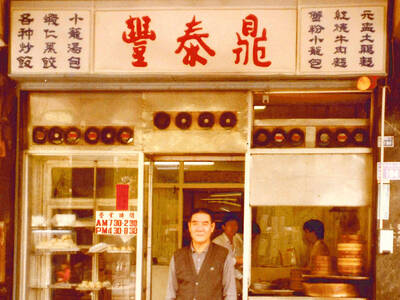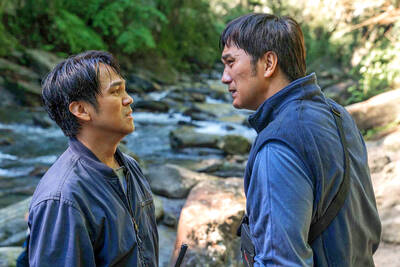With a celebrity owner (singer and TV host Pauline Lan, 藍心湄) and a prime location in Taipei’s East District (東區), Kiki Restaurant is one of the best-known spots for Sichuan cooking in Taipei. Reservations are a must: On a Friday visit, one of our six-member party was reduced to sitting on a stool when the restaurant ran out of chairs even though we had called ahead for a table. The waiting time last Sunday night for walk-ins was an hour.
The long lines, slightly snooty service (we were curtly informed on the phone that reservations are held for only 10 minutes) and less-than-comfy seating (chairs are made of the same hard plastic as the stools) are made up for by the sheer deliciousness of the food. Kiki rates the spiciness of its dishes from one to four stars, with the latter being for diners with iron tongues. On our first visit, we seared our taste buds with the Sichuan-style spicy braised bean curd (麻婆豆腐, NT$200) and stir-fried minced pork with Chinese chives and fermented black beans (蒼蠅頭, NT$220) — and those two dishes rated only three stars. Slightly gentler courses include the very good four seasons beans with minced pork and Chinese spices (干扁四季豆, NT$210) and “the pan fried eggs until they are golden brown and then stir-fried with ground chili peppers” (回鍋蛋, NT$180). The menu’s detailed description of the latter dish doesn’t capture its sheer awesomeness. Hard-boiled eggs are sliced and then stir-fried with a variety of tasty spices and minced chili peppers. The resulting combination of flavors and textures — the sharp and savory spices against the firm egg white and soft yolk — will make your tongue happy, even if it is still recovering from the mapo tofu. The Sichuan-style stir-fried chicken with chili peppers (宮保雞丁, NT$280) was also very good, if a tad salty, with large chunks of meat mixed with peanuts and slices of chili peppers.
On a second visit, my companion and I ordered braised oysters with fermented black beans (豆豉青蚵, NT$290). The fermented beans added just the right amount of kick and contrast to the plump and juicy shellfish. Throwing caution to the wind, we taunted our arteries with salted grilled pork slices (鹽豬肉, NT$270), which probably consisted of the fattest cuts the butcher could find on the pig. As a counterpoint to the strong flavors of the braised oysters and pork, we selected the very mild braised silk melon with clams (絲瓜炒蛤蜊, NT$270). Each slice of melon was indeed silky and smooth and the clams were fat, but a little tough. Salty dried shrimp kept the dish from becoming bland.
Tables for two are available, but you’ll get the most out of Kiki if you go in a larger group. For one thing, the portions are somewhat skimpy, and expensive. Drinks include Kiki’s special plum juice (鳥梅汁, NT$140 per carton or NT$45 per glass), which is supposed to help soothe chili-addled mouths. Red and white wines are available by the bottle (NT$1,000); the former is pleasantly dry but not particularly memorable. A small selection of cocktails, Taiwan beer, and teas are also available; the most incongruous option on the beverage menu is probably
the iced Oreo smoothie (Oreo
冰沙, NT$200).
Go to www.kiki1991.com for information on other Kiki franchises.

March 24 to March 30 When Yang Bing-yi (楊秉彝) needed a name for his new cooking oil shop in 1958, he first thought of honoring his previous employer, Heng Tai Fung (恆泰豐). The owner, Wang Yi-fu (王伊夫), had taken care of him over the previous 10 years, shortly after the native of Shanxi Province arrived in Taiwan in 1948 as a penniless 21 year old. His oil supplier was called Din Mei (鼎美), so he simply combined the names. Over the next decade, Yang and his wife Lai Pen-mei (賴盆妹) built up a booming business delivering oil to shops and

Indigenous Truku doctor Yuci (Bokeh Kosang), who resents his father for forcing him to learn their traditional way of life, clashes head to head in this film with his younger brother Siring (Umin Boya), who just wants to live off the land like his ancestors did. Hunter Brothers (獵人兄弟) opens with Yuci as the man of the hour as the village celebrates him getting into medical school, but then his father (Nolay Piho) wakes the brothers up in the middle of the night to go hunting. Siring is eager, but Yuci isn’t. Their mother (Ibix Buyang) begs her husband to let

The Taipei Times last week reported that the Control Yuan said it had been “left with no choice” but to ask the Constitutional Court to rule on the constitutionality of the central government budget, which left it without a budget. Lost in the outrage over the cuts to defense and to the Constitutional Court were the cuts to the Control Yuan, whose operating budget was slashed by 96 percent. It is unable even to pay its utility bills, and in the press conference it convened on the issue, said that its department directors were paying out of pocket for gasoline

On March 13 President William Lai (賴清德) gave a national security speech noting the 20th year since the passing of China’s Anti-Secession Law (反分裂國家法) in March 2005 that laid the legal groundwork for an invasion of Taiwan. That law, and other subsequent ones, are merely political theater created by the Chinese Communist Party (CCP) to have something to point to so they can claim “we have to do it, it is the law.” The president’s speech was somber and said: “By its actions, China already satisfies the definition of a ‘foreign hostile force’ as provided in the Anti-Infiltration Act, which unlike